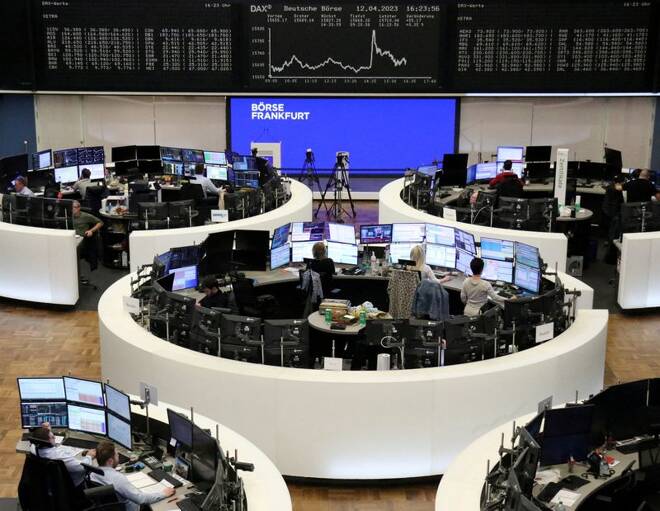Advertisement
Advertisement
European stocks: A global investor’s new best friends
By:
By Dhara Ranasinghe, Samuel Indyk and Alun John
By Dhara Ranasinghe, Samuel Indyk and Alun John
LONDON (Reuters) -European equity markets are basking in a glow that even greater uncertainty unleashed by turmoil in the banking sector appears not to be able to dim.
Having started the year on a strong footing as the energy crisis abated and China’s economy reopened from COVID-related lockdowns, European shares, like others, took a step back after the collapse of two U.S. lenders and a forced rescue of Credit Suisse.
Two weeks of relative calm are encouraging investors to pick up the “Buy Europe” baton once more, motivated by cheap valuations, signs that China’s reopening is boosting European firms, a weak dollar and softening inflation.
A broad measure of European shares, the STOXX 600 index, is trading at 14-month highs, taking this year’s gains to almost 10%. That compares with an 8% rally in the U.S. S&P 500 index.
Blue-chip stocks have put on an even more eye-popping performance, having scaled 22-year highs this week and are up some 10% this year, outpacing U.S. peers.
In the absence of bad news from the economy or earnings, those gains are expected to continue for now.
James Rutland, a European equities fund manager at Invesco, noted that consistent outflows from European shares last year, when the energy crisis dealt the region a fresh blow, had left valuations at very cheap levels.
Even after recent gains there were factors in Europe’s favour, he said, as “global investors haven’t really looked at Europe for a very long time, and there is some way for that overall negative sentiment to reverse.”
A broad index of European stocks is trading at a multiple of 12.6, compared with a ratio of 18.1 for the S&P 500, according to Refinitiv data. This 5.5 point premium is above the five-year average of around 4 points, suggesting European shares look cheap compared to their U.S. counterparts.
Graham Secker, chief European equity strategist at Morgan Stanley, said European equities had been a “structural underperformer” between the end of the global financial crisis in 2008 to the outbreak of the COVID crisis in 2020, with a rebound starting late last year.
“This has broken European stocks out of their relative downward trend, so we don’t think Europe is now a structural underperformer,” he said.
“That doesn’t mean it’s a structural outperformer either, but does mean that investors are adjusting and so there’s a steady drip feed of global money back into Europe.”
Dollar weakness, signs that inflation is abating and company earnings boosted by China’s economy reopening were also viewed more generally as positive signs.
LVMH, the world’s largest luxury company, last week reported a 17% rise in first-quarter sales, more than double analysts’ expectations, as business in China rebounded sharply. Luxury handbag market Hermes reported strong sales on Friday.
It was no surprise that France’s luxury-heavy CAC 40 hit a record high last week.
“Stocks and sectors that we see as well placed for China’s reopening, including luxury goods firms, should continue to provide attractive opportunities for investors in European equities this year,” said Thomas McGarrity, head of equities at RBC Wealth Management.
Stop for earnings
For the rally to continue, earnings are the next hurdle for shares in Europe to overcome, with the earnings season ramping up in earnest this week.
First-quarter earnings for Europe’s biggest companies are expected be flat year-on-year, according to Refinitiv I/B/E/S, with revenue forecast to increase just 1.7%.
“We assume Q1 earnings will be okay because growth has been fairly resilient, so I don’t see earnings being a shocker,” said Emmanuel Cau, head of European equity strategy at Barclays. “If earnings are okay, we might see the market continue for the time being.”
Yet, with much of the real-world impact of previous central bank rate rises to be seen, corporate earnings could face further headwinds if the economy experiences a sharp slowdown.
Banking turmoil has tightened financing conditions and raised global recession risks. The International Monetary Fund last week trimmed its 2023 global growth outlook.
“I wouldn’t be surprised if this is the first earnings season and then the subsequent Q2 earnings where you will see the impact of the tightening feeding into the real economy,” said Sandrine Perret, multi-asset portfolio manager at Unigestion.
“That’s why we remain cautious on risk as we know this is likely to happen in the coming months.”
(Reporting by Dhara Ranasinghe, Samuel Indyk and Alun John; Editing by Mike Harrison)
About the Author
Reuterscontributor
Reuters, the news and media division of Thomson Reuters, is the world’s largest international multimedia news provider reaching more than one billion people every day. Reuters provides trusted business, financial, national, and international news to professionals via Thomson Reuters desktops, the world's media organizations, and directly to consumers at Reuters.com and via Reuters TV. Learn more about Thomson Reuters products:
Advertisement
